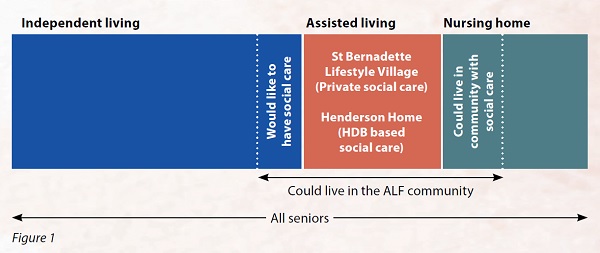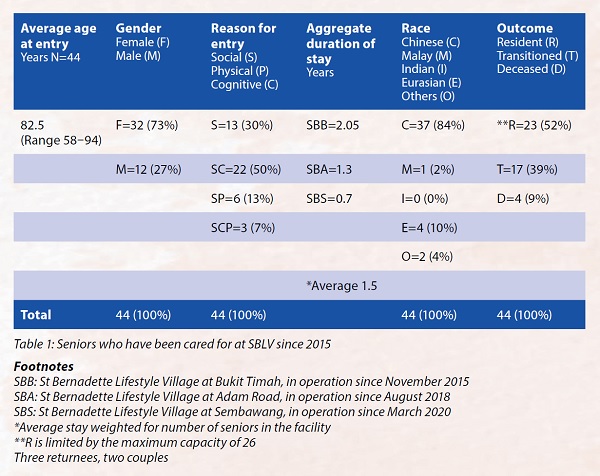Medical professionals in Singapore may be surprised when they have rare encounters with patients who are residents from assisted living facilities (ALFs) with access to resident doctors, nurses and round-the-clock support services. Many mistakenly think that ALFs are nursing homes.
Indeed, the ALF model of care is not well understood in Singapore, because it is comparatively new and not yet mainstream. The concept of ALFs has been adopted in many countries, and the characteristics of these ALFs are many and varied.1 Recently, the ALF concept has gained traction in Singapore, with its own unique set of characteristics that best serve the needs of older Singaporeans as a desirable intermediate and long-term care option. The next generation of Singaporeans' ideas for eldercare have evolved, and they are searching for alternative options that can better fit their life circumstances and needs. We have observed that there is an increasing demand for assisted living from the new generation of seniors, so much so that the Harmony Village @ Bukit Batok (an assisted living project) was oversubscribed by up to four times when it was launched in early 2021. In addition, we are also seeing that ALFs can provide care options that fit well with the future of eldercare in Singapore.
In this article, we present the case of Singapore's first accredited ALF, the St Bernadette Lifestyle Village (SBLV) and describe its model of care.
Specifically, we hope to increase general understanding about assisted living as a long-term care and residential option for older adults in Singapore, as well as examine their benefits to senior citizens. As such, we will share concepts, describe challenges and suggest future directions. In addition, we will also discuss characteristics of ALFs that help seniors to age within the community, thereby preventing institutionalisation or premature institutionalisation.
How we care
The model of care practised at SBLV focuses on personal care, social care and light-touch healthcare in a homelike environment. Established in 2015, the organisation is a subsidiary of the Good Shepherd Loft, a nursing home located at Bukit Timah Road.2 Currently, each SBLV ALF consists of a group of eight to 12 seniors living in retrofitted houses in residential estates, with a multi-tiered monthly fee structure that covers housing, meals, housekeeping, as well as 24-hour supervision and support services.2 These small groups enable a higher quality of care and were especially useful when we needed to deploy safe-distancing measures during the COVID-19 pandemic.
Safety measures during the pandemic have led to the increased sense of loneliness in the elderly population,3 and highlighted that assisted living is even more important in the support of elders' well-being. Because there is a small number of residents in each ALF, employees can provide individualised attention and cultivate meaningful relationships with residents and families.4 Accommodations are designed with barrier-free access and include private en suite rooms that are fitted with handrails, grab bars, emergency call buttons as well as motion sensors that monitor seniors' health and enable the activation of appropriate care when needed.2
While residents may be dependent on some assistance for activities of daily living (ADLs) and instrumental activities of daily living, they are able to perform four out of the six basic ADLs. As demonstrated in Figure 1, seniors with physical and mental health assistance needs do not always require the intensity of medical and nursing services provided in nursing homes.2 On the other hand, seniors who are independent may also desire to live in ALFs for the social engagement opportunities. Enriching social engagement within the assisted living community is encouraged, as these activities have therapeutic benefits and would be superior to living at home alone.5

Upon admission, a care plan is developed together with the resident and their family/guardian. Dignity and discerned autonomy form the foundation of the care plan, with pillars of care that include the statement of care, social care, pastoral care as well as policies on communicating incidents with the resident's family. Indeed, the family members' interest in being involved in monitoring the care of their loved ones enhances the well-being of the residents.6 This care plan is reviewed annually or as needed on a periodic basis, in order to keep it relevant to the resident's changing needs.2 In addition to the focus on social care, the care model draws upon direct and indirect communications to integrate social care and healthcare support.
The central pillar of the system is the resident doctor and nurse manager who utilise the system to track and manage any issues that may arise. Support teams are critical and are serviced by the nurse aide, physiotherapy aide, care aide, health aide and social worker, who provide timely feedback to the core team. The entire team works together to mitigate potential excessive healthcare usage, such as frequent hospital and A&E admissions. In essence, integrated care supports the residents' well-being, giving elders the ability to engage in meaningful activities provided by the ALF and lead a better quality of life. The model of care presented is aligned with assisted living concepts in Japan and the US, and the SBLV concept is suitable for inclusion into the Urban Redevelopment Authority's Centre for Liveable Cities' plans for senior-living typologies.
Challenges
Little is written about accredited ALFs in Singapore. Our first task was to write the Assisted Living Facilities Association's 2018 Good Practice Guide titled Dignity and Discerned Autonomy Assisted Living Care Tool.2 Since then, the ageing population has grown. It is our hope that by sharing the care model at SBLV, we can provide insight to end users, prospective ALF operators, policymakers and financial institutions in the aged care sector.
There have also been challenges faced in developing SBLV, especially in public and institutional education, policy shifts on land use, manpower, fire safety regulations as well as funding models. These hamper smooth ALF development efforts in Singapore. Through this preliminary review of SBLV as a successful ALF concept, we hope to expand into a more robust ALF sector, thereby attracting more stakeholders to develop such care models in Singapore.
Future directions
Future directions point toward increasing considerations for eldercare options such as assisted living. Singapore is fast becoming a super-aged nation with a growing population of older adults. It was reported that the average Singaporean's life expectancy has increased, but many are struggling with chronic disease burdens and need daily assistance.7 Therefore, seniors may search for assisted living services to support their need for daily assistance. Table 1 illustrates the profile of seniors who have been cared for at SBLV.

In addition, the new cohorts of older Singaporeans are wealthier than previous cohorts.7 This financial status allows them the ability to explore alternative eldercare options such as assisted living services. These seniors value assisted living's focus on dignity, autonomy and the ability to grow old within a residential neighbourhood that features normalcy, rather than be relegated to an institution away from the rest of the community.8 They also feel more at ease in the home-like environment of ALFs which is more familiar and comforting to them.5,8
Our recommendation is for retrofitted homes rather than purpose-built facilities to avoid the formation of "senior ghettos". Specifically, if one floor in designated HDB flats could be set aside for ALFs, residents could remain in the community for a longer period of time, while having access to daily support services that mitigate premature institutionalisation. These facilities can also double-up to provide respite care, day care and night care services. In addition, we hope that there will be some funding for assisted living, with regard to sustainability, just as with nursing homes.
Finally, are ALFs merely an add-on facility? The short answer is no. ALFs can extend a person's period of independence with some judicious assistance, as the person's need for assistance may increase but not to the point of requiring nursing home care yet. The provision of ALF services may well lessen the need to build more nursing homes and is indeed the missing piece in the eldercare continuum of Singapore. The new thinking would be to have more ALF services in place.
Discussion
Through this article, we have shared concepts regarding how a successful assisted living model of care practised in Singapore can be realised to benefit senior citizens. However, the concept of ALFs is new and not well understood. In addition, little is written about such facilities in Singapore. This has resulted in missed opportunities for an ageing population where ALFs are becoming increasingly necessary. More discussion is needed on the public and industry level regarding how ALFs and nursing homes provide different but possibly complementary care services. The public needs to understand this so that they can make well-informed decisions about the most appropriate model of care for their life circumstances. On the industry level, there is the need for additional research that investigates the impact of assisted living in Singapore. Once there is increased understanding and industry growth, partnerships, quality, processes and structure will subsequently be further strengthened.
Conclusion
Assisted living is the new kid on the block. It fulfils the missing piece in the healthcare system of a country. There is potential to develop this area of healthcare in Singapore and countries across the world.
Acknowledgements
The authors thank Prof Kua Ee Heok and Isabel Siow for their contributions to this article.